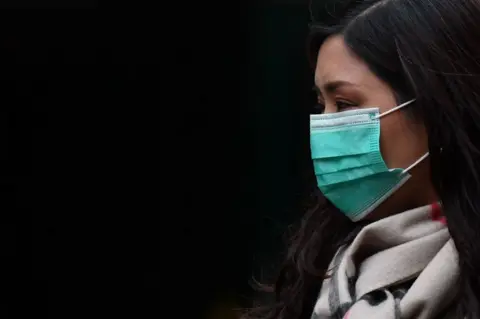Coronavirus outbreak preparations stepped up in Scotland
 Getty Images
Getty ImagesNicola Sturgeon has chaired a Scottish government resilience meeting as preparations for a coronavirus outbreak are stepped up.
Health Secretary Jeane Freeman said they were "expecting an outbreak" in Scotland and were working on plans to contain it.
However she stressed that the risk to individuals was low.
A total of 412 people have been tested for the virus in Scotland but they have all returned negative results.
Earlier The Foreign Office updated its travel advice, warning against all but essential travel to 11 quarantined towns in Italy.
The 11 towns in Lombardy and Veneto - areas which attract tourists for their ski resorts - have been put into lockdown after 229 tested positive for the virus and seven died.
Across the UK, 13 people have been confirmed to have the virus from 6,795 patients tested.
The Scottish government's resilience meeting follows warnings from Chief Medical Officer Catherine Calderwood that it was "highly likely" there would be a positive case of coronavirus - known as Covid-19 - in Scotland.
Their preparations include:
- Establishing two testing laboratories in Glasgow and Edinburgh to speed up identification of confirmed cases
- Supplying GPs surgeries with face masks and ensuring hospitals are fully stocked with personal protective equipment
- Updating public health legislation to make coronavirus a notifiable disease.
Speaking after the meeting, Ms Freeman said: "We are expecting an outbreak and are working hard to ensure we have plans in place to contain it as best we can. The NHS and Health Protection Scotland have an established plan to respond to anyone who becomes unwell.
"Scotland is well-prepared for a significant outbreak of coronavirus but there is currently no treatment or vaccine. Therefore, preventing the spread of any outbreak will be vital, and the Scottish government is working closely with NHS Scotland and Health Protection Scotland to ensure this.
"We have a proven track record of dealing with challenging health issues and have public health and infectious disease experts working intensively on these issues."
She added: "The public also has a vital role to play in helping us contain any outbreak by following the latest health and travel advice, and following basic hygiene precautions, such as washing hands and covering their nose and mouth with a tissue when coughing or sneezing."
 Getty Images
Getty ImagesMeanwhile, Highland Council has issued a precautionary letter to parents of pupils who have recently returned from a school skiiing and snowboarding trip to northern Italy.
The snowsports resort is outside the Lombardy region but the airport the school group used was on the western fringe of the Lombardy-Piedmont boundary.
The NHS said the risk of coronavirus to individuals on the trip was very low.
However parents have been advised that medical advice should be sought if any respiratory symptoms appear such as a cough, high temperature or shortness of breath.


The Scottish government has also updated its travel advice for people returning to the country from regions affected by the virus.
Anyone who has returned from the following areas since 19 February should stay indoors and avoid contact with other people, even if they do not have symptoms:
- Iran
- The lockdown areas of northern Italy
- Certain areas of South Korea
- The Hubei province of China.
Those who have returned from these areas and display or develop symptoms should contact their GP or NHS 24 on 111 out-of-hours.
People who have travelled to the UK from Cambodia, Laos, Myanmar and Vietnam are also now advised to monitor their health and isolate themselves if they develop symptoms.
Full details can be found on NHS Scotland's fitfortravel website.
The main signs of infection are fever (high temperature) and a cough as well as shortness of breath and breathing difficulties.
Frequent handwashing with soap or gel, avoiding close contact with people who are ill and not touching your eyes, nose and mouth with unwashed hands can help cut the risk of infection.
Catching coughs and sneezes in a tissue, binning it and washing your hands can minimise the risk of spreading disease.


